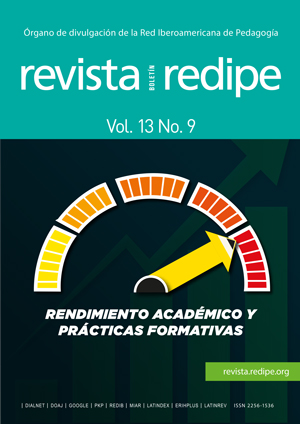Gender roles in the illustrations of Colombian languaje textbooks
Main Article Content
Keywords
Gender roles, Stereotypes, Inequality, Representation, Textbooks, Education
Abstract
In this research we set out to analyze the representation of gender roles based on the illustrations of the official language books in Colombia for the sixth, seventh, eighth and ninth grades. Critical Discourse Analysis from a feminist approach (CDAF) was chosen. The corpus were the images present in the textbooks Vamos a aprender lenguaje from sixth to ninth grades. The discursive strategies were identified and what these strategies reveal was explained. A total of 762 images were analyzed. An imbalance was found in the representation of gender, with 71% of male figures and 29% of female figures. A spatial and professional distribution marked by gender and racial stereotypes was observed, with a double marginalization of female figures, especially indigenous and Afro-descendant women. It is concluded that textbooks reflect gender inequalities, perpetuate gender stereotypes and biases that limit women’s perceptions and opportunities, maintaining and reproducing social hierarchies that affect women. It is essential to consider Colombia’s ethnic diversity in order to move towards a more equitable and fair representation in society, recognizing the importance of critically addressing the content of textbooks.
References
Análisis del nexo entre el comercio y el género desde la perspectiva del desarrollo: un breve resumen. Conceptos, definiciones y marcos analíticos. (2022). Organización para las Naciones Unidas ONU, https://unctad.org/system/files/ official-document/ditc2021d2_es.pdf
Bernabé Villodre, M. d. M., García Gil, D., & Martínez Bello, V. (2021). Pervivencia de estereotipos de género en las imágenes de los libros de texto de música españoles. Educação e Pesquisa, 47(e236340). https://doi.org/10.1590/ S1678-4634202147236340
Blumberg, R. L. (2007). Gender bias in textbooks: A hidden obstacle on the road to gender equality in education. París: Unesco. https://citeseerx.ist.psu.edu/document? repid=rep1&type=pdf&doi=95ef5cbbba 3e36543eb59f6ce307e233111e07db
Cambio Colombia. (s.f.). Obtenido de Cambio Colombia: https://cambiocolombia.com/ articulo/peso-peso-paso-paso/asi-estala-piramide-de-la-educacion
Castillo, M. J., & Burgos, M. (2022). Reflexiones de futuros maestros sobre la idoneidad didáctica y modo de uso de una lección de libro de texto. Bolema: Boletim de Educação Matemática, 36(72), 555- 579. http://dx.doi.org/10.1590/1980- 4415v36n72a25
Carrillo Castro, A. (2011). Breve historia de la desigualdad de género: (3 ed.). Plaza y Valdés (México). https://elibro-net. ezproxy.cecar.edu.co:2443/es/lc/ bibliocecar/titulos/39142
Contreras Salinas, S., & Ramírez Pavelic, M. (2011). Análisis de textos literarios infantiles: avanzando en la desconstrucción de códigos patriarcales. Revista Estudos Feministas, 19(2), 573-590. http://educa.fcc.org.br/scielo. php?script=sci_arttext&pid=S0104- 026x2011000200018&lng=pt&tlng=.
De Colombia, R. (2013). Ministerio de Salud y Protección Social. Encuesta Nacional de la Situación Nutricional ENSIN https://www.minsalud.gov.co/ proteccionsocial/paginas/ciclovida. aspx#:~:text=0%2D5%20a%C3%B1os.
Duarte Mora, S., & Páez Ochoa, D. A. (2016). Equidad de género en los textos escolares de ciencias sociales de cuarto de primaria. [Tesis para optar por el título de Licenciatura En Lengua Castellana E Inglés]. Universidad Cooperativa de Colombia. https://repository.ucc.edu. co/items/29a8a2d8-66b0-44b9-96a1- 0f796358759d
Filipović, J., & Kuzmanović Jovanović, A. (2020). Aproximación crítica a la educación intercultural y al aprendizaje y enseñanza de lenguas extranjeras: las ideologías de género neoliberales en los libros de texto de español como lengua extranjera. Porta Linguarum. Una revista internacional sobre la enseñanza y el aprendizaje de lenguas extranjeras, 34, 55-74. https://doi.org/10.30827/portalin. vi34.16733
Foucault, M. (1980). Microfísica del poder. Ediciones de.
Foucault, M. (2001). Historia de la sexualidad (Vol. 1). Siglo XXI.
García, A. & Freire, M. (2003). Desarrollo del género en la feminidad y la masculinidad: ( ed.). Narcea Ediciones. https://elibronet.ezproxy.cecar.edu.co:2443/es/ ereader/bibliocecar/45968?page=56



